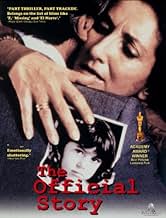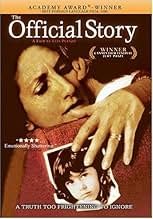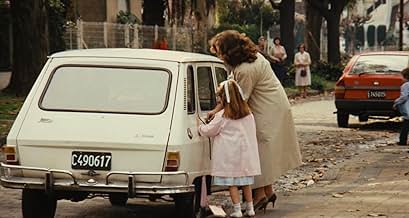IMDb रेटिंग
7.7/10
11 हज़ार
आपकी रेटिंग
1983 में अर्जेंटीना के सैन्य तानाशाही के अंतिम महीनों के दौरान, एक हाई स्कूल टीचर यह पता लगाने की कोशिश करती है कि उसकी गोद ली हुई बेटी की माँ कौन है.1983 में अर्जेंटीना के सैन्य तानाशाही के अंतिम महीनों के दौरान, एक हाई स्कूल टीचर यह पता लगाने की कोशिश करती है कि उसकी गोद ली हुई बेटी की माँ कौन है.1983 में अर्जेंटीना के सैन्य तानाशाही के अंतिम महीनों के दौरान, एक हाई स्कूल टीचर यह पता लगाने की कोशिश करती है कि उसकी गोद ली हुई बेटी की माँ कौन है.
- 1 ऑस्कर जीते
- 25 जीत और कुल 9 नामांकन
फ़ीचर्ड समीक्षाएं
I saw this movie in my first-year Spanish class. I love all kinds of movies, both international and domestic. This is by far one of the best movies I have seen in the international field with particular focus on the character development of one woman who seems to have everything. In coming to terms with the truth of her lifestyle and the high price others have paid for her comfort, she becomes a heroine who must give up almost everything she has loved and felt identified who she is. This movie is both heartbreaking and reassuring for its audience. I highly recommend it as a thoughtful depiction of how ignoring politics can imply inadvertently becoming an accomplice.
This Piece was powerful and thought provoking. It was also perhaps the most depressing film I have ever seen in my life. The tragic story leaves the viewer with a somewhat empty feeling, which is appropriate. The sad fact is that thousands of families in Argentina fell the emptiness that this film induces every single day of their lives. Hector Alterio spectacularly portrays the jaded and evil Roberto, who works with the corrupt ruling military junta. One truly grasps a sense of the insecurities and weakness behind such bullies.
This movie is a wakeup call for anyone who believes that apathy is okay. The truth is that the tragedies in Argentina in the 1970's were partly allowed to occur because of the ignorance and apathy of both people within Argentina and in the outside world. Hopefully, by watching this film, people will resolve to prevent such a tragedy from ever happening again.
La Hitoria Oficial is a spectacular film to learn about a subject which receives little or no attention in the US. However, be warned: it is one of the most tragic films you may ever see in your life. You will leave the film both saddened and angered that nothing was done to prevent these horrible crimes.
This movie is a wakeup call for anyone who believes that apathy is okay. The truth is that the tragedies in Argentina in the 1970's were partly allowed to occur because of the ignorance and apathy of both people within Argentina and in the outside world. Hopefully, by watching this film, people will resolve to prevent such a tragedy from ever happening again.
La Hitoria Oficial is a spectacular film to learn about a subject which receives little or no attention in the US. However, be warned: it is one of the most tragic films you may ever see in your life. You will leave the film both saddened and angered that nothing was done to prevent these horrible crimes.
A searing political exposé situated in the immediate aftermath of Argentina's Dirty War (1976- 1983), director Luis Puenzo's second feature THE OFFICIAL STORY became the first Argentinian movie to snatch Oscar's BEST FOREIGN LANGUAGE PICTURE laurels.
In 1983, the seemingly perfect life of a middle-class high-school history teacher Alicia Ibáñez (Aleandro) starts to crack when she begins to suspect the birth parents of her adopted daughter Gaby (Castro, an elfin darling), now 5-year-old, might be victims of political persecutions during the military dictatorship. She is determined to find out the truth and inexorably clashes with her husband Roberto (Alterio), who is a well-off government representative and might be in the knowing from the very start.
Puenzo and his co-screenwriter Aída Bortnik import a limpid script to set Alicia to embark on a late-but-better-than-never realization of her country's buried horror which implausibly has been eluded by her until that point, as one of her colleagues Benítez (Contreras) jests that nothing is more gratifying than a guilty bourgeois woman.
What makes Alicia tick is the return of her best friend Ana (Villafañe) from abroad, during an escalatingly poignant two-hander from the two magnificent actresses, Ana confesses to her that she was subjected to torture by the secret police (she is an associate of a subversive) and was forced into exile. Ana's account jolts Alicia into facing up with that troubling question, at the same time, a subplot pertains to the rebellious polemic of Alicia's students (atrociously played by actors much maturer than high schoolers) also vouch for the progress on her conscience. When she finally meets Sara (Ruíz), possibly Gaby's biological grandmother, she bestirs herself with a final attempt to reason with her intransigent husband.
Apart from the film's polemical angle in cashing in on a topical powder keg, in retrospect, the film's more lingering sway is underlain by its less argumentative depiction of women's place in a typical patriarchal society, through our heroine, Alicia is an ordinary woman in every aspect, mostly hedged in her domestic remit, a mother and a wife, Roberto has never cared to ask anything about her job, as if it is just a hobbyhorse to keep her busy. During Roberto's apoplectic wrangle with his leftist father Jose (Battaglia) and brother Enrique (Arana), Alicia's total silence speaks volumes in that tableau vivant - women have no voice in politics (neither in religion, as glanced through Alicia's vain endeavor inside a confessional, belittled by a snotty man of God), they are subservient, ancillary and biddable, but, as a human being, every sane soul is endowed with the judgment of right and wrong, and Puenzo's sensible work pays the highest homage to that, which makes the ending incredibly uplifting albeit with such a small gesture, as it would happen in real life.
Puenzo assembles an ace cast, Villafañe, Battaglia, Ruíz are all bankable scene-stealers, but no one can upstage Norma Aleandro's pyrotechnics, which oozes heartfelt nuance to countervail a melodramatic milieu Alicia is entangled with and staunchly refuses any trace of ham. On the other hand, Héctor Alterio embodies Roberto, a mouthpiece of the junta, with repulsion-inducing exertion as the sole villain in the film, an outstanding feat to accomplish out of a less well-rounded character.
All in all, Puenzo's blunt cri-de-coeur is graced with a lyrical accompanying score and an encroaching camera-work as if it tries to delve as deep as possible into its characters' psyche, an engaging infotainment with humanity unflaggingly glistening in its nucleus.
In 1983, the seemingly perfect life of a middle-class high-school history teacher Alicia Ibáñez (Aleandro) starts to crack when she begins to suspect the birth parents of her adopted daughter Gaby (Castro, an elfin darling), now 5-year-old, might be victims of political persecutions during the military dictatorship. She is determined to find out the truth and inexorably clashes with her husband Roberto (Alterio), who is a well-off government representative and might be in the knowing from the very start.
Puenzo and his co-screenwriter Aída Bortnik import a limpid script to set Alicia to embark on a late-but-better-than-never realization of her country's buried horror which implausibly has been eluded by her until that point, as one of her colleagues Benítez (Contreras) jests that nothing is more gratifying than a guilty bourgeois woman.
What makes Alicia tick is the return of her best friend Ana (Villafañe) from abroad, during an escalatingly poignant two-hander from the two magnificent actresses, Ana confesses to her that she was subjected to torture by the secret police (she is an associate of a subversive) and was forced into exile. Ana's account jolts Alicia into facing up with that troubling question, at the same time, a subplot pertains to the rebellious polemic of Alicia's students (atrociously played by actors much maturer than high schoolers) also vouch for the progress on her conscience. When she finally meets Sara (Ruíz), possibly Gaby's biological grandmother, she bestirs herself with a final attempt to reason with her intransigent husband.
Apart from the film's polemical angle in cashing in on a topical powder keg, in retrospect, the film's more lingering sway is underlain by its less argumentative depiction of women's place in a typical patriarchal society, through our heroine, Alicia is an ordinary woman in every aspect, mostly hedged in her domestic remit, a mother and a wife, Roberto has never cared to ask anything about her job, as if it is just a hobbyhorse to keep her busy. During Roberto's apoplectic wrangle with his leftist father Jose (Battaglia) and brother Enrique (Arana), Alicia's total silence speaks volumes in that tableau vivant - women have no voice in politics (neither in religion, as glanced through Alicia's vain endeavor inside a confessional, belittled by a snotty man of God), they are subservient, ancillary and biddable, but, as a human being, every sane soul is endowed with the judgment of right and wrong, and Puenzo's sensible work pays the highest homage to that, which makes the ending incredibly uplifting albeit with such a small gesture, as it would happen in real life.
Puenzo assembles an ace cast, Villafañe, Battaglia, Ruíz are all bankable scene-stealers, but no one can upstage Norma Aleandro's pyrotechnics, which oozes heartfelt nuance to countervail a melodramatic milieu Alicia is entangled with and staunchly refuses any trace of ham. On the other hand, Héctor Alterio embodies Roberto, a mouthpiece of the junta, with repulsion-inducing exertion as the sole villain in the film, an outstanding feat to accomplish out of a less well-rounded character.
All in all, Puenzo's blunt cri-de-coeur is graced with a lyrical accompanying score and an encroaching camera-work as if it tries to delve as deep as possible into its characters' psyche, an engaging infotainment with humanity unflaggingly glistening in its nucleus.
La Historia Oficial is an excellent movie. It is also the testimony of the suffering of the Argentinian people during the military dictatorship. But those who are not from Argentina, like myself, can very well be touched by this movie. I was observing the cruelty of the government and thought "my God, totalitarism is always the same, and no matter if the violation of human rights occurs in Argentina under the military regime, in Cuba under the Castro dictatorship, in Chile under Pinochet, in Europe during Hitler, people suffer the same and the least we can do is to feel compassion". A good lesson from this movie, generation after generation we shouldn't forget the victims. They deserve justice.
La Historia Official is a well-made film about awakening from passive complicity in evil, in this case, forced adoption. The Grandmothers of the Plaza de Mayo were and are an inspiration to those who struggle to uncover and resist abuses in adoption practices, be they the enslaved Irish women of the Magdalen laundries or the many indigenous peoples who had children forcibly removed from homes to be adopted by whites. Most of adoption does not involve abduction, but to turn a blind eye to the fact that it does exist, is to be passively complicit, as was the protagonist in this film.
The scene in which the teacher realizes that tremendous evil has indeed been perpetrated, and that she may very well be the beneficiary of such evil, is staggering. Norma Aleandro is a talented enough actress that we believe her initial rejection of this revelation, and her gradual evolution from passive cohort to courageous seeker of the truth.
The scene in which the teacher realizes that tremendous evil has indeed been perpetrated, and that she may very well be the beneficiary of such evil, is staggering. Norma Aleandro is a talented enough actress that we believe her initial rejection of this revelation, and her gradual evolution from passive cohort to courageous seeker of the truth.
क्या आपको पता है
- ट्रिवियाThe filming began in 1983, the same year that the military dictatorship ended in Argentina. The filming was cancelled due to the threats received by the director, actors and particularly to Analia Castro's family. It was announced that filming was cancelled, but production continued in secret until 1985.
- इसके अलावा अन्य वर्जनThe 2015 restoration is extended by 2 minutes due to the inclusion of restoration credits at the beginning and end of the film. The opening restoration credits play over the opening scenes in Alicia's classroom. During the restoration end credits, the background goes black and the instrumental version of 'El país de nomeacuerdo' is looped.
टॉप पसंद
रेटिंग देने के लिए साइन-इन करें और वैयक्तिकृत सुझावों के लिए वॉचलिस्ट करें
- How long is The Official Story?Alexa द्वारा संचालित
विवरण
बॉक्स ऑफ़िस
- US और कनाडा में सकल
- $29,426
- US और कनाडा में पहले सप्ताह में कुल कमाई
- $29,426
- 10 नव॰ 1985
- दुनिया भर में सकल
- $69,832
इस पेज में योगदान दें
किसी बदलाव का सुझाव दें या अनुपलब्ध कॉन्टेंट जोड़ें
































